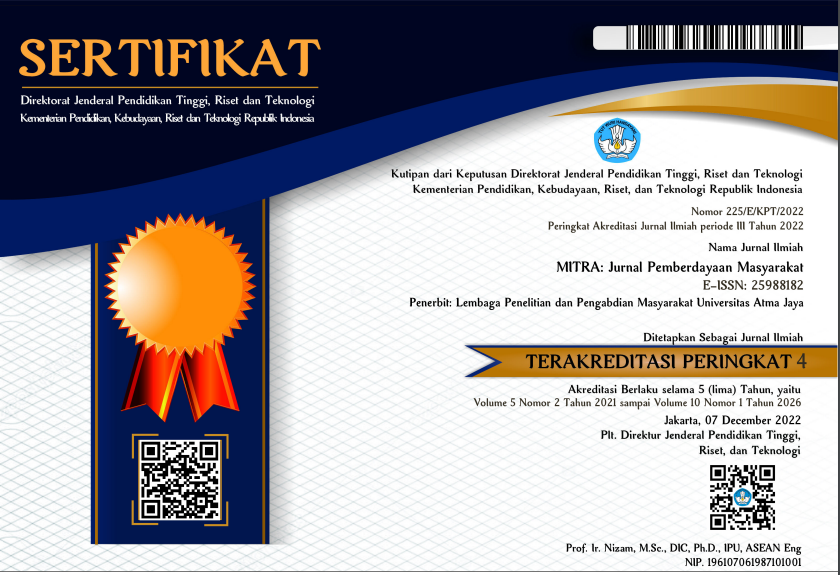Increased Knowledge of Pringwulung Youth Group, Sleman, on the Use of Solar Energy to Support Energy Security
DOI:
https://doi.org/10.25170/mitra.v4i2.1158Keywords:
solar energy, youth group, energy securityAbstract
The youth group RT10/ RW40 Pringwulung, Condong Catur, Depok, Sleman Yogyakarta Special Region is located east of SMKN 2 Depok, Sleman. This youth group formed a semi-autonomous activity centre under the youth organization which aims to provide knowledge to children in RT 10 about natural science. To implement the objectives, the workshop collaborated with several partners as resource persons for the activity. Some of the partners included lecturers and student associations around the location. The educational background of the youth groups varies from high school to tertiary education. The Adisutjipto College of Technology through its lecturers attempted to increase the knowledge of youth group members through a community-service partnership program on alternative energy, especially solar energy which has the potential to support energy security. It is hoped that through this activity the youth groups would be able to increase their knowledge. This community-service activity used the presentation method and to check the knowledge of youth group members, tests or questions and answers were provided with both at the beginning of the activity and the end of the activity. In addition, a small group discussion (SGD) was also conducted so that the participants could discuss the presentation material and improve the understanding of the material. In this community service activity, there was an increase in participants' knowledge, and indicators of improvement were shown from the results of the small group discussion, pre-test, and post-test sessions. The average percentage of increase of their knowledge from the pre-test and posttest results was 36%.
References
Azmi, R., & Amir, H. (2014). Ketahanan energi: Konsep, kebijakan dan tantangan bagi Indonesia. Badan Kebijakan Fiskal Kementerian Keuangan. Diakses dari https://www.kemenkeu.go.id/sites/default/files/energy%20security.pdf pada 2 Februari 2020.
Hani, S. (2015). Pembangkit listrik energi matahari sebagai penggerak pompa air dengan
menggunakan solar cell. Jurnal Teknologi Technoscientia, 7(2), 157-163.
Kurniawati, L. (2017). Kebijakan dana ketahanan energi sebagai upaya mewujudkan ketahanan energi sebagai upaya mewujudkan ketahanan energi nasional: konsep dan tantangannya. Jurnal Manajemen Keuangan Publik, 1(1), 29-41.
Manju, B., Bari, A., & Pavan C .M . (2018) Automatic solar panel cleaning system.International Journal of Advances in Scientific Research and Engineering (ijasre), 4, 26-31.
Nor, C., & Pratiwi, D. A. (2015). Sosysm: Inovasi pembangkit listrik tenaga panas matahari guna menurunkan biaya operasional PT Berkah Vannamei Bantul. Pelita-Jurnal Penelitian Mahasiswa UNY, X(2), 26-34.
Panunggul, D. A., Boedoyo, M. S., & Sasongko, N. A. (2018). Analisa pemanfaatan energi terbarukan di Universitas Pertahanan sebagai pendukung keamanan pasokan energi (Studi kasus: energi surya dan angin). Jurnal Ketahanan Energi, 4(2). 75-91.
Quentara, L.T., & Suryani, E. (2017). The development of photovoltaic power plant for electricity demand fulfillment in remote regional of madura island using system dynamics model. Procedia Computer Science, 124, 232–238.
Rustam, C. W., & Rahayu, A. Y. S. (2016). The dynamics of national energy resilience system in Indonesia. International Journal of Economic Research, 13(2), 529-551.
Subarjo, A.H., Mardwianta, B., & Wicaksono, A.B. (2019). Efisiensi kompor surya parabola berreflektor cermin untuk menunjang ketahanan energi. Jurnal surya energy, 4(1), 345-352.
Subarjo, A.H., Mardwianta, B, & Wibowo, T (2020), Peningkatan pengetahuan pemanfaatan energi matahari untuk mendukung ketahanan energi pada kelompok pemuda di Sendangtirto, Berbah, Sleman. Jurnal Kacanegara, 3(02), 147-154.
Downloads
Published
Issue
Section
License
This license allows reusers to distribute, remix, adapt, and build upon the material in any medium or format for noncommercial purposes only, and only so long as attribution is given to the creator. If you remix, adapt, or build upon the material, you must license the modified material under identical terms.



_.jpeg)

.png)
2.png)
.png)
.png)



